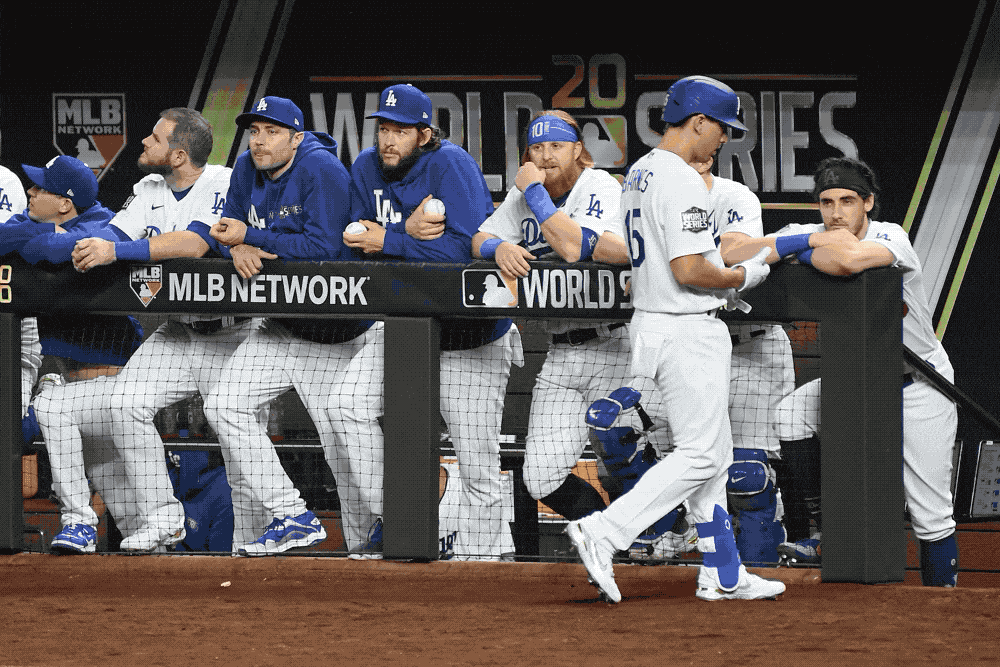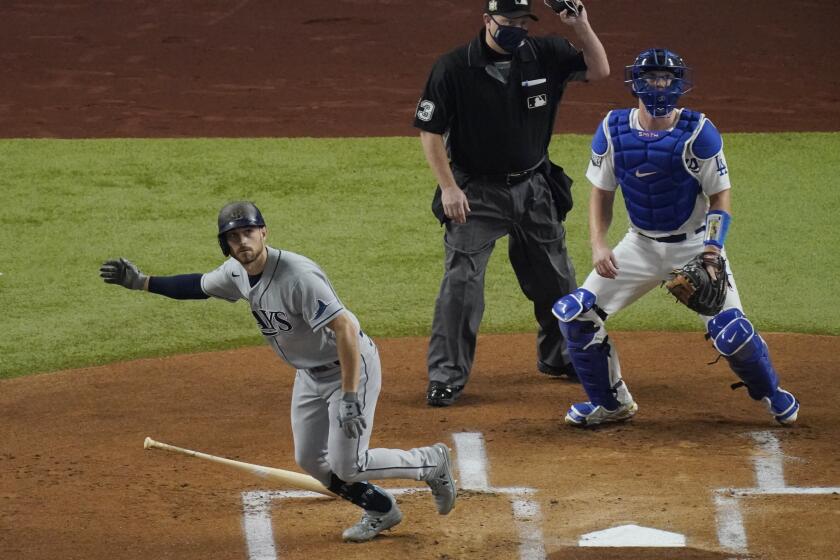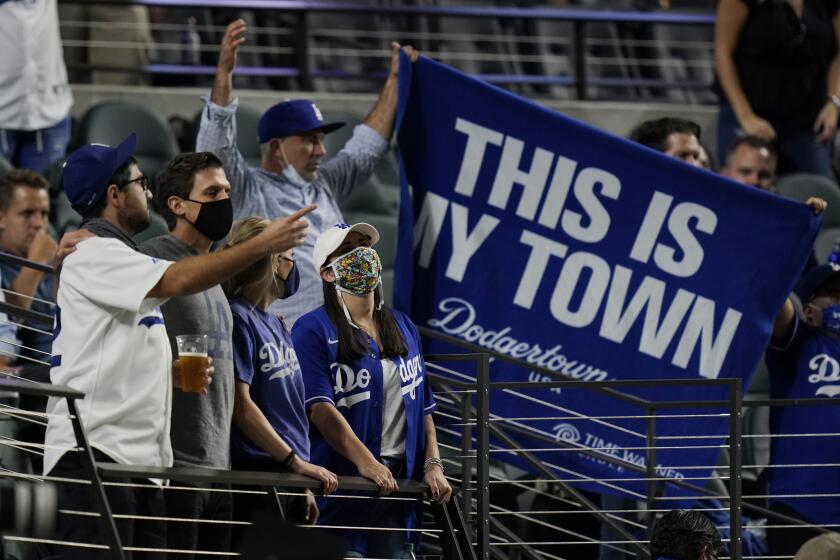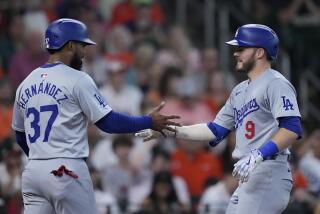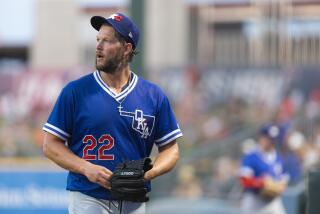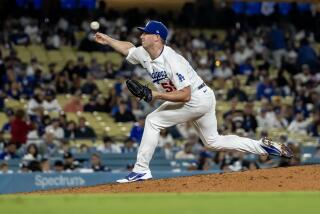Dodgers have stopped Rays’ Randy Arozarena. But he can still ruin their World Series
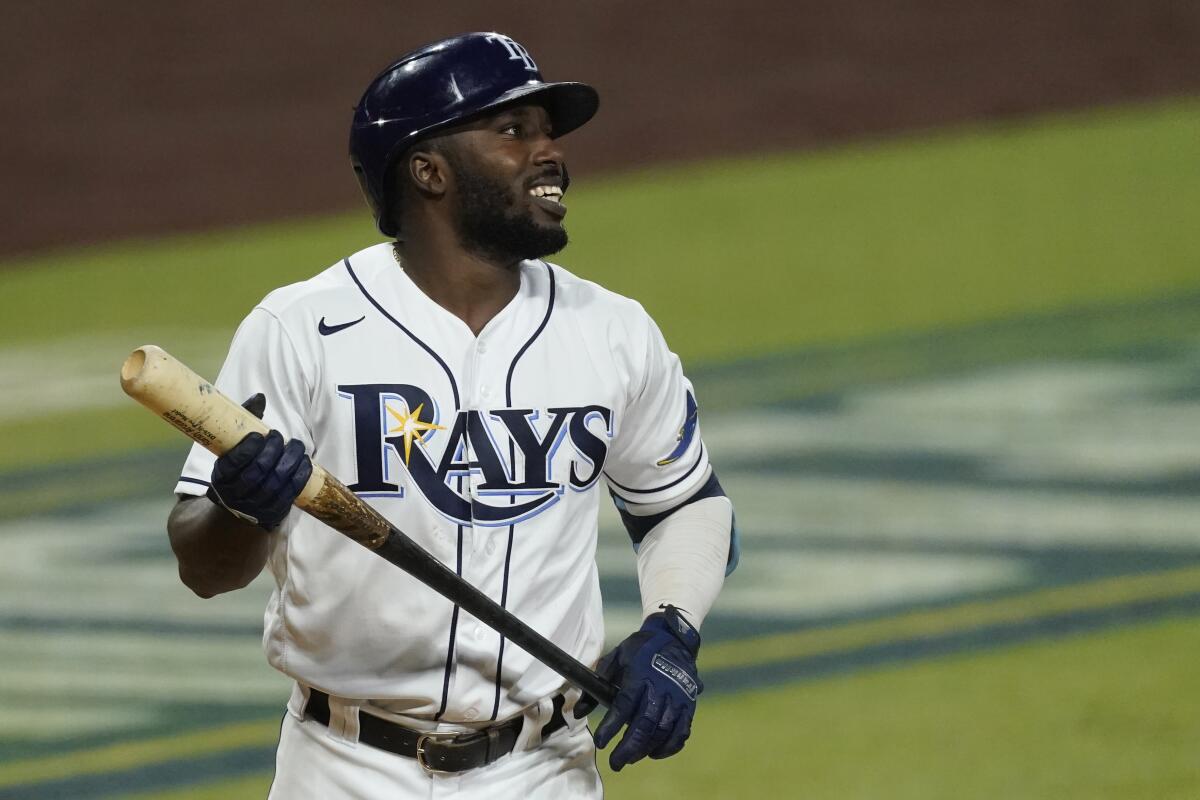
- Share via
A Tampa Bay Ray who can ruin the Dodgers’ shot at a championship didn’t get a hit in his first seven plate appearances of the World Series. He didn’t make it past second base in the first two games. He was intentionally walked — his third free pass of the series — before he even got his first hit in the ninth inning of Game 2. He narrowly beat third baseman Justin Turner’s throw to first base.
Hustle secured that two-out knock. And hustle easily could turn favor in the Rays’ direction if the Dodgers aren’t careful with outfielder Randy Arozarena, the breakout star who tied Derek Jeter for most hits in a single postseason by a rookie (22) with that infield single off Jake McGee.
Through two games, the Dodgers have neutralized the threat of the 185-pound man who became an internet sensation for spinning on his head in a celebratory dance-off with his teammates and strutting around in what he calls botas de poder — boots of power.
Arozarena saw 29 pitches and 16 were outside of the zone. He didn’t offer at most of the balls, chasing only three. In the 11 times he swung, he whiffed five times.
The Dodgers are the favorite to win the World Series, but they didn’t play like it in Game 2. Should they be worried about losing to the Tampa Bay Rays?
The Dodgers’ game plan is clear-cut: Do not give Arozarena an opportunity to get his barrel to the ball.
Perhaps if the New York Yankees or Houston Astros had adopted a similar approach, one of them might be playing the Dodgers instead of the Rays.
Arozarena, 25, ignited the Rays with an unprecedented 2½ weeks at the plate. He hit seven home runs — a rookie record for most in a postseason, surpassing former Rays star Evan Longoria — while batting .382 (21 for 55) with 10 RBIs.
Arozarena was named MVP of the American League Championship Series, and manager Kevin Cash still couldn’t find words to describe the rookie’s importance to the Rays.
A few days later, he remarked on what makes Arozarena so impressive.
“The adjustability that he’s shown in the at-bat, or at-bat to at-bat,” he said. “To watch a guy walk up to the plate and get breaking ball-ed to death, not see a fastball and be ready to hit it, and knock it out of the ballpark is pretty impressive.
“[He was] just picking up little things on how really good pitchers were going to attack him. Putting it in his memory bank, almost like with the thought of, ‘If you go there again, I’m going to be ready for it.’”
Said outfielder Kevin Kiermaier: “You don’t see electricity in a bat like that for a guy his size too much. He’s very intriguing. Hard to put a label on him.”
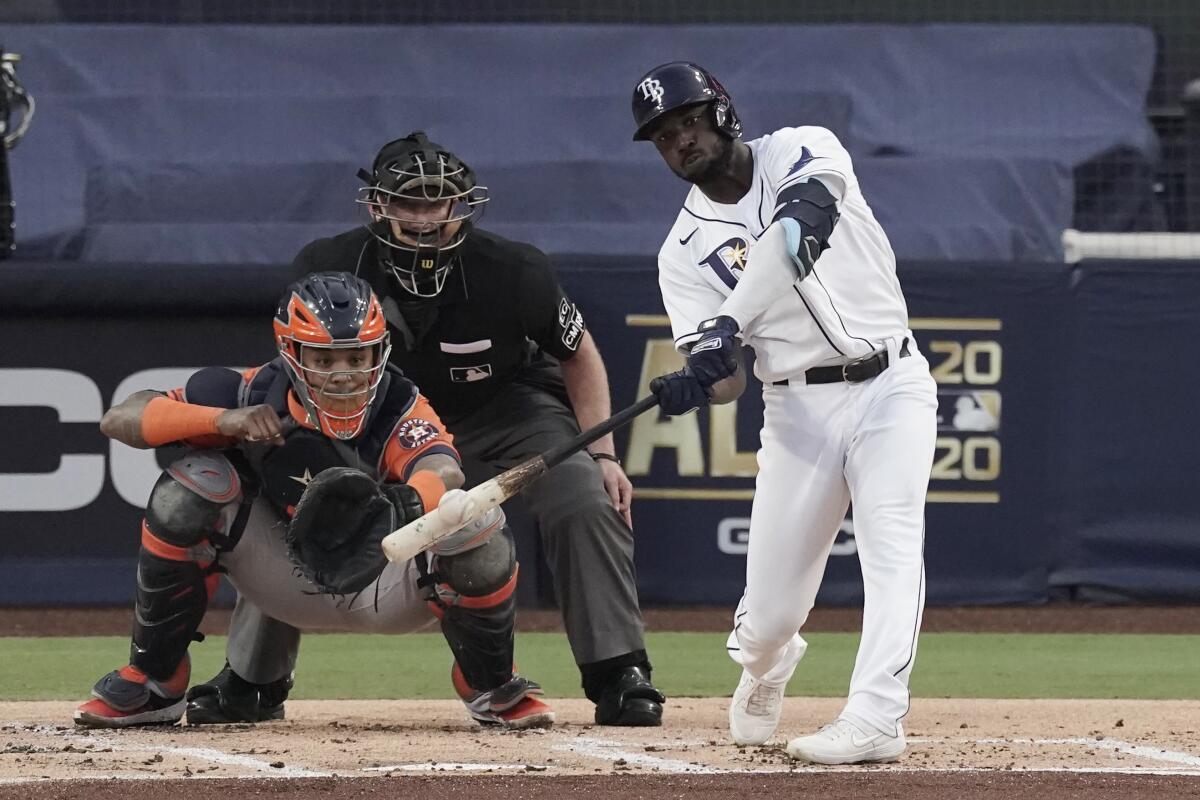
Arozarena’s success is by design. A talented athlete, he played soccer and baseball at a high level during his childhood. He was selected for Cuba’s under-18 national baseball team. He played alongside future Chicago White Sox players Yoan Moncada and Luis Robert and put himself on the radar of the St. Louis Cardinals, who traded him and José Martinez to the Rays in January. After he stopped playing soccer to pursue a more profitable career in Cuba’s top baseball league, Arozarena’s star continued to climb.
Yet at 19, soon after his father died from an allergic reaction to seafood during a trip to watch his son play in the postseason, Arozarena felt stunted. Vegueros de Pinar del Río, his hometown team, left him off the Serie del Caribe playoff roster. He told broadcaster Beto Ferreiro on a wide-ranging YouTube Live interview in Spanish last week that he became disillusioned with the business of baseball in Cuba and decided to defect to Mexico to better provide for his family.
“I already was being paid more than my mom,” Arozarena said. “I said [to myself], ‘I have to do everything for my family.’ I had to go.”
After an eight-hour ride on a small boat with a handful of other baseball players, he settled in the Mexican state of Yucatán. There, he linked up with longtime player agent Jaime Torres and mentor Jorge Campillo, a former major league pitcher who was then vice president of the Mexican League’s Toros de Tijuana.
The Tampa Bay Rays, fueled by Brandon Lowe’s slump-busting Game 2 performance, underscored that this World Series won’t be a walkover for the Dodgers.
They took Arozarena in while he established residency, a requirement for players seeking to sign free-agent contracts with MLB teams after defecting Cuba. They made sure he played in front of scouts in Liga Norte, the Mexican League’s equivalent to the minors, and facilitated his signing for $1.25 million with the Cardinals.
Arozarena’s journey from Cuba defector to minor leaguer lasted about 15 months. It might have gone off the rails if he hadn’t made the wise decision to relocate closer to the United States border, away from the players with whom he braved the Gulf of Mexico.
“He didn’t think the training was going well,” Campillo said in Spanish. “He saw too much partying. He talked to me and said he wanted to go to Tijuana. He and his uncle decided to move because he wasn’t getting the preparation he needed. That’s where I noticed he was a kid that knew what he wanted. He wanted to play in the big leagues and he knew that staying in Yucatán wouldn’t help.”
Arozarena flourished with the help of Campillo and a trainer, Guillermo Armenta. He grew into his thin, 5-foot-11 frame and continued to impress with his speed — both on the ground, where he could run a 60-yard dash in 6.4 seconds, and at the plate with his bat. Unlike many players his age, he did not struggle to flash all five tools.

When international director Moises Rodriguez of the Cardinals and scout Ramón Garcia approached with an offer about half what Campillo and Torres expected, Arozarena didn’t hesitate to take it.
Money isn’t important, he told Campillo. I want to prove that I can play in the major leagues.
And he has. The Cardinals promoted Arozarena for a cup of coffee in mid-August 2019, after he won player of the month honors twice and was named a triple-A all-star. He played 19 games down the stretch, hit .300 and made their postseason roster.
He wound up in Tampa Bay not because the Cardinals gave up on him, but because they had a glut of outfield prospects and the Rays were willing to part with left-hander Matthew Liberatore, ranked among Baseball America’s top 50 prospects.
The Rays’ confidence in his ability played a factor in Arozarena’s coming out party this fall. Although the Rays didn’t promote him until the trade deadline following a monthlong battle with the coronavirus that caused him to miss summer camp, they were excited to see what the outfielder could do once he was no longer blocked in the lineup. He batted .281 with seven homers and a 1.022 OPS in 23 games and played a crucial role in helping the Rays lock up the top seed in the American League.
Is Texas the Dodgers new home away from home? Plenty of Dodgers fans were in attendance for Game 2 of the World Series against the Tampa Bay Rays.
His hot streak continued into October. The Dodgers have so far managed to dampen his flame.
But they’ll need to watch out.
“It might be too soon, too outlandish to compare him to Mookie Betts,” Campillo said. “[Betts] is the best player in the major leagues. But [Arozarena] is comparable. He’s projected to get there. He can run, he has a strong arm and he can hit for power.”
More to Read
Are you a true-blue fan?
Get our Dodgers Dugout newsletter for insights, news and much more.
You may occasionally receive promotional content from the Los Angeles Times.
